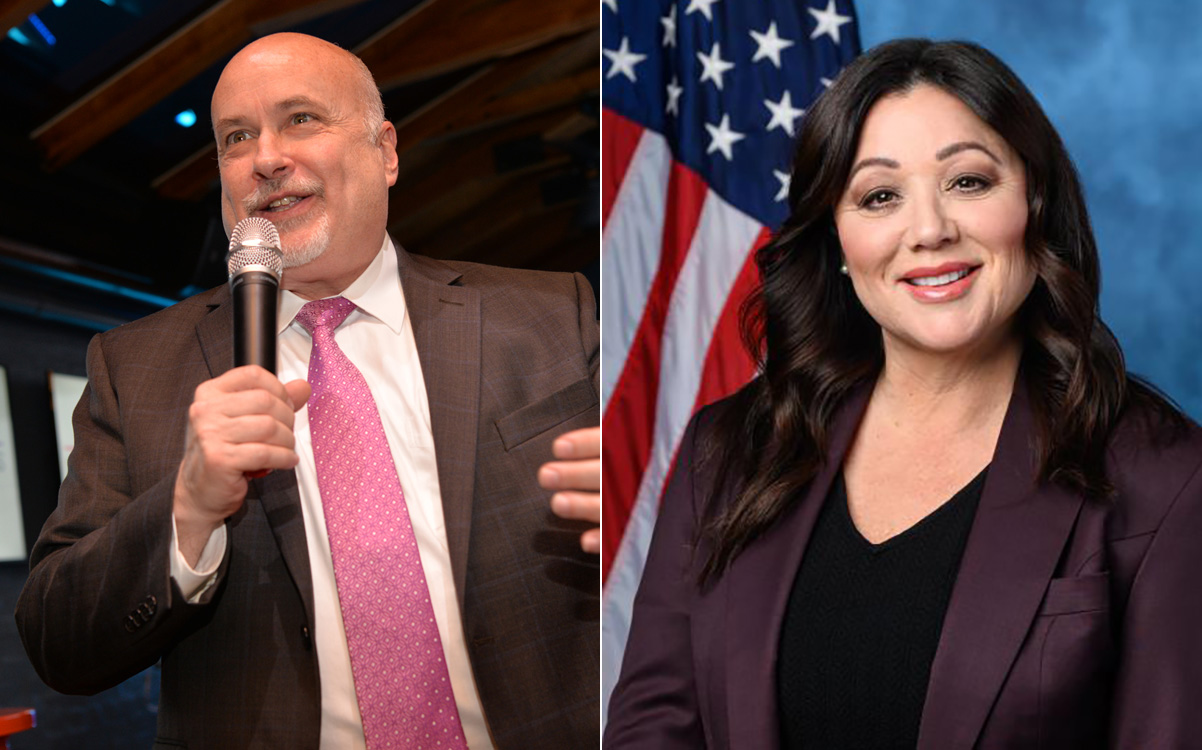Congress
Partisan disagreements imperil efforts to redress harms of ‘Don’t Ask, Don’t Tell’
Challenges come despite bipartisan interest in addressing the problem

Despite bipartisan agreement over the need to bring justice to U.S. service members who were harmed by discriminatory military policies like “Don’t Ask, Don’t Tell,” competing legislative efforts have divided members of Congress and sparked accusations that both Democrats and Republicans are “playing politics” with the issue.
Following the repeal of “Don’t Ask, Don’t Tell” in 2011, thousands of veterans who were discharged other than honorably over their sexual orientation continue to face barriers finding housing and employment, with many unable to access federal benefits that otherwise would be available to them.
The Pentagon has endeavored to address the problem, but advocates say the agency has been too slow to act while service members, rather than the Department, bear the considerable burden of requesting reviews of their papers – a process so complicated that many have had to seek legal counsel for help navigating the bureaucratic red tape.
Gay U.S. Rep. Mark Pocan (D-Wis.), who chairs the Congressional Equality Caucus, has long worked to address the challenges faced by veterans who are in this position with his Restore Honor to Service Members Act, which he first introduced in 2013 and re-introduced several times over the years, most recently in 2023.
Among the subsequent iterations were the bicameral version introduced in 2019 by Pocan and U.S. Rep. Katie Hill (D-Calif.) along with U.S. Sens. Brian Schatz (D-Hawaii) and U.S. Sen. Kirsten Gillibrand (D-N.Y.), and another that was introduced in the Senate last year by Schatz, which was backed by Republican U.S. Sens. Todd Young (Ind.) and Susan Collins (Maine).
The National Defense Authorization Act for FY 2024 was passed in the Senate with provisions taken from the Restore Honor to Service Members Act, including directions for the Pentagon to establish a “Tiger Team” to “build awareness among veterans of the process established [by the NDAA in FY 2020] for the review of discharge characterizations by appropriate discharge boards.”
Pocan, along with caucus co-chairs U.S. Reps. Robert Garcia (D-Calif.) and Chris Pappas (D-N.H.), wrote to U.S. Secretary of Defense Lloyd Austin last month to request information to facilitate implementation of the department’s decision to (1) review records for service members who were discharged under “Don’t Ask, Don’t Tell,” (2) forward cases to their respective secretaries to consider correction through the service boards, and (3) reach out to veterans to make sure they are kept up to speed throughout the process.
Last week, however, another bill targeting the same issue, the Recover Pride in Service Act, was announced by Republican U.S. Rep. Lori Chavez-DeRemer (Ore.) in conjunction with Log Cabin Republicans, the conservative LGBT group.
A spokesperson for the congresswoman told the Washington Blade in a statement, “There’s a significant difference between the two bills. The Recover Pride in Service Act requires the Department of Defense to automatically upgrade all discharges that were solely based on sexual orientation within five years.”
The spokesperson continued, “This key provision would ensure veterans adversely impacted by Don’t Ask, Don’t Tell won’t have to endure an arduous and costly application process and can get their status updated without having to lift a finger. I would also note that just 10 percent of LGBTQ+ veterans have had their discharges upgraded, and that’s because of the application process. Only requiring an outreach group isn’t enough.”
The Recover Pride in Service Act would also, per the press release announcement, establish an “Outreach Unit” to contact service members who were discharged for their sexual orientation along with other reasons specified in their papers. The bill promises to simplify administrative requirements and includes a provision stipulating that “a lack of documentation cannot be used as a basis for denying a review, and the responsibility of finding and producing relevant documentation lies with the DOD, not the service member.”
“If Republicans truly cared about helping veterans discharged under ‘Don’t Ask, Don’t Tell,’ they would have signed on to the Restore Honor to Service Members Act, which has been around for a decade and has support among the broader LGBTQI+ community,” Pocan told the Blade in a statement.
“Instead, they introduced a bill that plays partisan politics with the issue rather than advance it,” he said. “If we really want to do something to help veterans, there is a decade-long effort to get that done. Posing for pictures with a duplicative effort doesn’t get us closer to the goal.”
Log Cabin Republicans Senior Advisor Alex Walton told the Blade by phone last week that “discussions about the Restore Honor to Service Members Act all happened close to eight to nine months ago before we kind of shifted focus when we realized that they weren’t going to cooperate and work with us.”
Walton said that while there was significant interest in joining Pocan’s bill among House Republicans, “they were only going to do it assuming that Democrats were going to match the number of Republicans that co-sponsored the legislation, so you didn’t have 150 Democrats and, you know, 12 Republicans.” A source familiar with the discussions said Pocan was never asked to limit the number of Democratic cosponsors.
Additionally, Walton said, the House Republicans “also wanted a Republican lead,” but Pocan “was unwilling to let that happen.”
Months later, Walton said Pocan and House Democrats remained uncooperative in discussions over the Recover Pride in Service Act, the bill that was ultimately introduced by Chavez-DeRemer.
Meanwhile, he said, “We spoke to over 90 Republican offices, both in the House and the Senate, and we had a lot of conversations about this issue in general. And one of the things that we kept hearing from Republican offices is if a piece of legislation like this is going to pass, you’re gonna have to cut bureaucratic extras that are included in the Pocan version of the bill, and you’re just gonna have to get directly to the problem. And that’s what the legislation does by requiring the DOD to proactively upgrade these discharges.”
With Republicans holding the majority in the House, Walton said, Log Cabin and Republican members wanted a Republican lead sponsor on the bill in the lower chamber, while discussions were held with Senate Democrats with the expectation that a Democrat would be lead sponsor of the Senate version of the Recover Pride in Service Act.
Walton added that Pocan was offered the opportunity to be the lead Democratic member in the House — a claim that is disputed by the source familiar with the talks, who said the Wisconsin congressman was not consulted as the Recover Pride in Service Act was being drafted.
Pocan told the Blade, in a separate statement, that “I’ve had the Restore Honor to Service Members Act available for co-sponsorship for 12 years. Unfortunately, only a few Republicans have been interested in signing on. I welcome additional support. The best way to help our wrongly discharged veterans is to work in a bipartisan fashion with the members who’ve been working on this for a decade.”
He added, “I’ve been focused on getting justice for veterans discharged under ‘Don’t Ask, Don’t Tell’ for years, which is why part of the Restore Honor to Service Members Act became law several years ago” with the NDAA. “Losing the majority doesn’t mean I should surrender the rest of my bill —that’s not how Congress works. But I do welcome any support from Republicans who haven’t drunk the anti-equality Kool-Aid.”
Walton said that by refusing to work with Republicans in good faith, “Pocan put himself over all of these veterans,” adding, “I’m not disregarding everything Pocan has done for gays and lesbians in Congress. But the reality is that he put himself and his own pride in this legislation over actually getting stuff done.”
Walton stressed the broad ideological base of support for Chavez-DeRemer’s bill among House Republicans, 13 of whom have signed on as co-sponsors. Along with more moderate members, “we have extremely conservative Republicans on this legislation,” he said.
Those co-sponsoring members are GOP Reps. Kat Cammack (Fla.), Andrew Garbarino (N.Y.), Anthony D’Esposito (N.Y.) Nicole Malliotakis (N.Y.), Nancy Mace (S.C.), Derrick Van Orden (Wis.), Juan Ciscomani (Ariz.), Ken Calvert (Calif.), John Duarte (Calif.), Mark Amodei (Nev.), Mike Turner (Ohio), Max Miller (Ohio), and Mike Carey (Ohio).
Several of these House Republicans have voted for anti-LGBTQ military policies, such as prohibitions on Pride month celebrations at U.S. military bases and provisions allowing employees at the Defense Department and the U.S. Department of Veterans Affairs to discriminate against LGBTQ service members if they oppose, for instance, same-sex marriage on religious grounds.
House must pass spending bills by Friday
Meanwhile, House Republicans have held up passage of critical spending bills by insisting on conservative policy mandates that stand no chance of passing in the Senate with Democrats in the majority, nor of being signed into law by President Joe Biden.
If they are not able to reach an agreement by Friday, funding will lapse for military construction, agriculture, transportation, and housing programs. A full government shutdown would be triggered if spending packages are not passed by March 8.
The Equality Caucus, in a post on X Monday, said, “Just a reminder as we barrel towards a gov’t shutdown this week: House Republicans’ partisan funding bills include more than 45 provisions attacking the LGBTQI+ community.”
They added, “The House GOP needs to stop playing games with queer people’s rights & agree to bipartisan funding bills.”
Historically, appropriations packages have been cleared by both chambers with wide bipartisan margins.
During a conference call on Friday, Republican House Speaker Mike Johnson (La.) told GOP members they were unlikely to see many of their policy priorities included in the spending bills. He met with Biden at the White House on Tuesday, alongside other congressional leaders including Senate Majority Leader Chuck Schumer (D-N.Y.), to continue negotiations ahead of Friday’s deadline.
Congress
Members of Congress introduce resolution to condemn Uganda’s Anti-Homosexuality Act
U.S. Reps. Mark Takano (D-Calif.) and Joyce Beatty spearheaded condemnation

More than 20 members of Congress on Thursday introduced a resolution that condemns Uganda’s Anti-Homosexuality Act.
Gay California Congressman Mark Takano and U.S. Rep. Joyce Beatty (D-Ohio) spearheaded the resolution that U.S. Reps. Becca Balint (D-Vt.), Lloyd Doggett (D-Texas), Adriano Espaillat (D-N.Y.), Robert Garcia (D-Calif.), Sylvia Garcia (D-Texas), Josh Gottheimer (D-N.J.), Raúl Grijalva (D-Ariz.), Pramila Jayapal (D-Wash.), Hank Johnson (D-Ga.), Gwen Moore (D-Wis.), Seth Moulton (D-Mass.), Jerry Nadler (D-N.Y.), Eleanor Holmes Norton (D-D.C.), Mark Pocan (D-Wash.), Delia Ramirez (D-Ill), Linda Sánchez (D-Calif.), Jan Schakowsky (D-Ill.), Brad Sherman (D-Calif.), Rashida Tlaib (D-Mich.), Ritchie Torres (D-N.Y.), and Debbie Wasserman Schultz (D-Fla.) co-sponsored.
“The House of Representatives condemns the government of Uganda’s criminalization and draconian punishments regarding consensual same-sex sexual conduct and so-called ‘’promotion of homosexuality,’” reads the resolution.
The resolution, among other things, also calls upon the Ugandan government to repeal the law.
“It is difficult to overstate the gross inhumanity of Uganda’s Anti-Homosexuality Act,” said Takano in a press release.
President Yoweri Museveni in May 2023 signed the law, which contains a death penalty provision for “aggravated homosexuality.”
The U.S. subsequently imposed visa restrictions on Ugandan officials and removed the country from a program that allows sub-Saharan African countries to trade duty-free with the U.S. The World Bank Group also announced the suspension of new loans to Uganda.
The Ugandan Constitutional Court in April refused to “nullify the Anti-Homosexuality Act in its totality.” A group of Ugandan LGBTQ activists appealed the ruling.
“Instead of focusing on rooting out corruption or ending extrajudicial killings, the Ugandan Parliament, president, and Constitutional Court have chosen to mark LGBTQ+ Ugandans as less than human,” said Takano. “Congress must not be silent in the face of such systematic, state-sponsored discrimination.”
“To all those LGBTQ+ people and your allies in Uganda — we see you,” added the California Democrat. “We and the Biden administration will not allow this terrible violation of basic dignity to go unchallenged.”
Congress
EXCLUSIVE: Sen. Padilla and wife Angela talk LGBTQ mental health
Couple to receive award from Gay Men’s Chorus of L.A. on Sunday

U.S. Sen. Alex Padilla (D-Calif.) and his wife, Angela Padilla, spoke with the Washington Blade for an exclusive interview last week ahead of their receipt of Voice Awards from the Gay Men’s Chorus of Los Angeles at a ceremony on June 30.
“I’ve known members” of the organization “off and on over the years, going back to my days on the city council in Los Angeles,” when battles were waged over California’s Proposition 8 banning same-sex marriage, Padilla said.
“I was proud to be an ally for a long time, but especially in those moments, really, as a public official, as an elected official, knowing how important allyship was,” he said, stressing “the tremendous talent of the chorus” and “what they represented individually and as a group” serving as allies for “young people who may not necessarily grow up in a supportive environment or in supportive families.”
“I work very closely with Joseph Guardarrama,” a board member for GMCLA, “for many years now on my nonprofit, and it’s all in support of mental health and wellness and educating people on how to get help, why they should get help, and why it’s important to take care of your brain,” Mrs. Padilla said by phone.
“I started FundaMental Change in 2017,” she said, to push for “the mental change that I feel that we have to have as a society when it comes to how we look at [and] how we treat mental health conditions.”
The senator’s wife added that LGBTQ people are twice as likely to have a mental health condition while dealing “with so much more social stigma and discrimination” than their straight and cisgender counterparts.
“This month we’re going to have a table for June 30 working with the [California] Department of Mental Health at the Pride parade,” she added. FundaMental Change also operates an LGBT Youth TalkLine and Trans Lifeline.
Padilla noted the organization’s work combatting stigma. “One thing that we recognize both coming from Latino families is the need to overcome stigma,” he said. “There’s a lot of misunderstanding or misperceptions about mental health.”
The effort is also central to the senator’s work as a policymaker, he said, referencing the bipartisan Senate Mental Health Caucus that he founded alongside U.S. Sens. Tina Smith (D-Minn.), Thom Tillis (R-N.C.), and Joni Ernst (R-Iowa) to serve as “a forum for us to share stories.”
“It’s been fascinating, there are more than 30 members of the caucus now, so about a third of the United States Senate,” he said. “It’s 50/50 Democrats and Republicans,” and when approached, every member had a story to share, whether about “something that they’ve been through [or] somebody in their family, a colleague, a neighbor who can relate.”
Padilla said his decision to announce the formation of the caucus concurrently with his visit to the San Francisco LGBT Community Center “was very intentional.”
When it comes to mental health, “We’ve really prioritized trying to develop bipartisan solutions,” he said, “because those are more sustainable here in Congress.”
The first bill backed by the caucus was Padilla and Tillis’s Local 9-8-8 Response Act of 2023, which “was to require the FCC to move to implement the geolocation technology to the 988 system.”
Unveiled by the Biden-Harris administration in 2022, the 988 Suicide and Crisis Lifeline is operated by the U.S. Department of Health and Human Services Substance Abuse and Mental Health Services Administration. The program provides the option for callers to reach specialized LGBTQI+ affirming counselors by pressing “3.”
On the importance of geolocation technology, Padilla said “if I’m here in Washington, and have a need to call 988, my area code on my phone is Los Angeles — so, I’d be passed through to the Los Angeles providers.”
The senator noted that the FCC “is moving forward with those improvements” independently of his bill’s path forward in Congress.
More broadly, some of the policy challenges concern supply and demand problems. “From a bigger picture, longer term perspective, we’re talking about the workforce needs,” Padilla said. “So, what’s the game plan for [getting] more psychologists or psychiatrists or counselors, more therapists, more everybody in the field to better serve people across the country?”
Padilla also discussed the importance of “cultural competence” as a means of guaranteeing the best possible treatment. “When we ask people to go get help, if there’s somebody that they can relate to or that they know gets them, the better quality experience in treatment is going to come,” he said.
“We’re not quite there yet with the Republican colleagues, but I have faith that in time we will get them there,” the senator added. “And again, the LGBTQ community is a prime example. You’ve got to feel comfortable going to somebody when you need help.”
Padilla said, “not everybody comes from a supportive environment; not everybody lives in a city or a state that is supportive. And at this particular time politically, they’re really under attack. They’re being targeted acutely. And that’s more reason and urgency to speak up and stand up.”
On Sunday, the Padillas will share the stage with the recipients of the third GMCLA Voice Award, from the critically acclaimed HBO series “We’re Here,” which follows drag queens as they travel the country to perform in one-night-only performances in small towns.
Mrs. Padilla celebrated the ways in which drag has brought communities together, recalling when RuPaul’s Drag Race “was first airing and it was like everyone was so interested in watching the show” and “it just brought people from everywhere.”
“I have a lot of frustrations, as a Latina, with the misrepresentation of our community and our culture in television and movies,” she said. “And I feel like every opportunity that you get to see something that’s just authentic — it’s such a benefit to everyone. It really helps us understand that we have more in common than not.”
“Drag is not new,” the senator said. “It goes back generations in the United States and I think for the LGBTQ+ community it can be can be very empowering, as an outlet for performers, but also participants in an audience to see on stage what you may not see in other places.”
Republican-led efforts to restrict access to drag performances, especially by young people, “feels like it’s an act of desperation,” Mrs. Padilla said.
“I think they’re resisting something that they don’t understand. I just think it’s really coming from a place of fear. And really not understanding the human behind it,” she said, adding that the reactionary forces are a product of the LGBTQ movement’s success and “that feeling of it’s out of their control.”
“The diversity of our communities, the diversity of our country, is a big source of strength,” Padilla said. “It’s just not always been embraced. I think a lot of people either misinterpret it or frankly exploit it to cause divisions in society.”
“We can’t ignore the political climate that we’re living in,” the senator said, “heightened only by the fact that it’s a presidential election year and we see who the Republican nominee is going to be.”
Looking ahead to November’s elections, he said, “as with so many other issues, LGBTQ+ rights and opportunity in the future — It’s a 180-degree difference between Joe Biden and Donald Trump. Let’s not take it for granted. Let’s not take it lightly. Let’s get out and vote.”

A group of drag queens on Tuesday traveled to D.C. to lobby members of Congress to support pro-LGBTQ legislation.
“Drag Race Philippines” judge Jiggly Caliente, “RuPaul’s Drag Race” season 13 contestant Joey Jay and Brigitte Bandit urged lawmakers to support the Equality Act, which would add gender identity and sexual orientation to the Civil Rights Act of 1964, and the Transgender Bill of Rights, which would add trans-specific protections to federal nondiscrimination laws.
Caliente, Jay and Bandit met with U.S. Reps. Juan Ciscomani (D-Ariz.), Mark Pocan (D-Wis.), Jasmine Crockett (D-Texas), Delia Ramirez (D-Ill.), Greg Casar (D-Texas), and Jen Kiggans (R-Va.) and/or their staffers.
Jay posted to her X account a picture of her, Caliente, and Bandit outside Crockett’s office. The Texas Democrat in response said “you’re always welcome, queens.”
You're ALWAYS welcome, queens! https://t.co/MlUrW3TOJA
— Congresswoman Jasmine Crockett (@RepJasmine) June 25, 2024
MoveOn organized the visit, which it called the Drag Lobby Day.
“Today we brought together a trio of advocates and drag artists to stick up for LGBTQ folks, talk about what’s at stake and fight back against some extremist, hateful attacks, and narratives from conservative politicians,” said MoveOn Campaign Director Nakia Stephens during a press conference outside the U.S. Capitol.
Caliente said the Equality Act and the Trans Bill of Rights “will make it easier for people to find and keep employment and protect our communities more fully from discrimination in housing, health care, and so much more.”
Jay, who now lives in Phoenix, cited statistics that indicate 320 trans people were killed in 2023. Jay also stressed to conservatives that drag queens and LGBTQ people are not “trying to shove our lifestyle down your throats.”
“We are just trying to live in peace without fear of being murdered,” said Jay.
(WASHINGTON BLADE VIDEO BY SEAN KOPEREK)
Bridget Bandit — known as the “Dolly of Austin” — has testified against two anti-drag bills in Texas while in drag. Bandit noted she joined an American Civil Liberties Union of Texas lawsuit against the state’s Senate Bill 12, which would have criminalized drag shows and other performances that took place in front of children, “to fight for our freedom of expression.”
A federal judge last September blocked the law from taking effect.
“This fight is far from over,” said Bandit. “We continue to face the effects of this harmful rhetoric legitimized by our lawmakers.”

Sean Koperek contributed to this story.
-

 Canada1 day ago
Canada1 day agoToronto Pride parade cancelled after pro-Palestinian protesters disrupt it
-

 Politics5 days ago
Politics5 days agoLGBTQ issues absent from Trump-Biden debate
-

 Theater4 days ago
Theater4 days agoStephen Mark Lukas makes sublime turn in ‘Funny Girl’
-

 Baltimore3 days ago
Baltimore3 days agoDespite record crowds, Baltimore Pride’s LGBTQ critics say organizers dropped the ball









